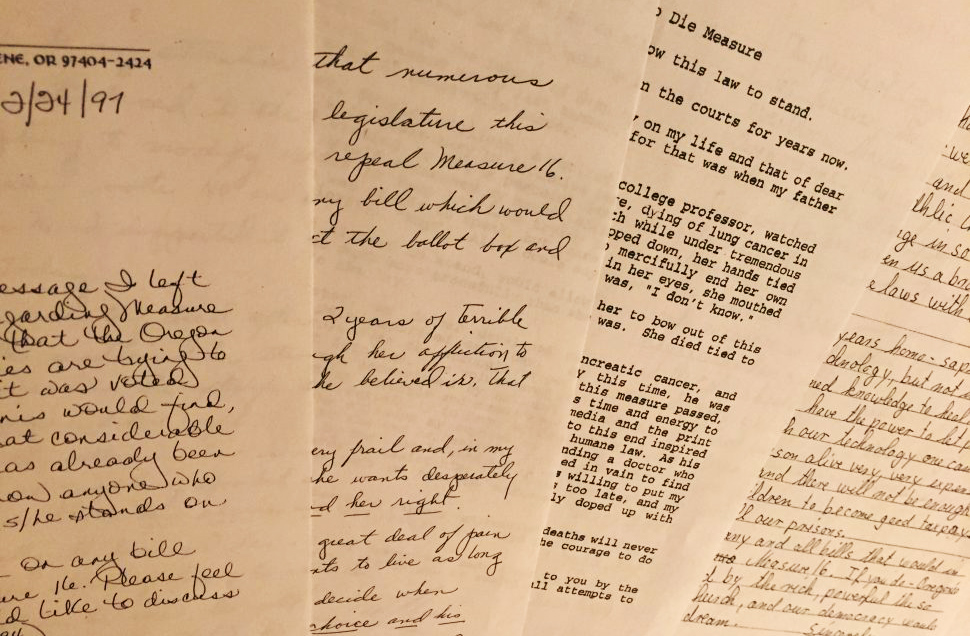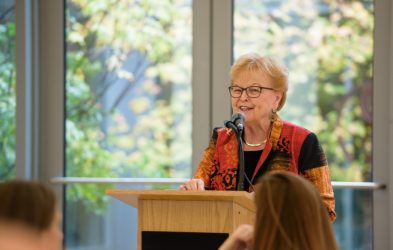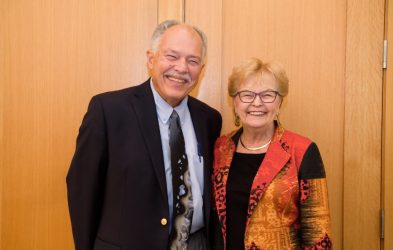To commemorate the 20th anniversary of implementation of the Oregon Death with Dignity Act, we are featuring stories of those who in 1997 campaigned against the repeal of the law adopted by Oregon voters 3 years before. Today we are featuring excerpts from citizen letters to Oregon State Representatives urging them to support the Act and defeat the repeal effort.
Other installments in the series:
- 20 Years of the Oregon Death with Dignity Act
- “A Better Way”: George Eighmey’s Journey Toward Death with Dignity Nationwide
- “We Never Gave Up”: Geoff Sugerman on Campaigning for Death with Dignity
- “A Last Loving Gift”: Nora Miller on Grief, Advocacy, and the Right to a Dignified Death
- “Everyone Should Have This Option”: Jan Rowe on her Family’s Commitment to Death with Dignity”
- “We Have to Be Part of the Debate:” Ann Jackson on the Role of Hospice in the Death with Dignity Movement
- “What Brittany Asked Us to Do”: Deborah Ziegler’s Advocacy for Death with Dignity Honors a Promise to Her Daughter
*
They wrote from Portland, Seal Rock, Eugene, and Brookings. Grants Pass, Salem, Chiloquin, and Bend. Florence, Rogue River, McMinville, and Corvallis.
In 1997, thousands of Oregonians wrote letters to their state representatives to voice their support for Measure 16, the Oregon Death with Dignity Act, passed by voters in 1994, and their opposition to Measure 51, the effort by some legislators and the Oregon Catholic Conference to repeal the Act. Some also sent letters to Oregon Right to Die, the political action committee started and led by Death with Dignity National Center founder and current Board member, Eli Stutsman, JD, that spearheaded the successful campaigns to pass the law and defeat the attempt to repeal it.
Some shared deeply personal stories of terminally ill loved ones who had suffered painful deaths. Others decried the Legislature’s attempt to override Oregonians’ passage of Measure 16 by placing on the ballot a measure that asked them to vote after they had made their voices heard on the issue.
Nearly all expressed frustration at the lobbying efforts by the Catholic Church to influence lawmakers and voters to overturn the state’s assisted dying law, citing unfounded arguments that the law lacked sufficient safeguards and left patients open to coercion by doctors. Similar to the faith-based arguments against abortion, the religious opposition emphasized the immorality of what they deemed “assisted suicide,” arguing that helping a terminally ill patient hasten their own death interfered with God’s will.

Oregonians from across the state wrote impassioned letters to legislators urging them to support the Oregon Death with Dignity Act and defeat the effort to repeal it.
Whether emotional or pragmatic, the letters speak to the importance of respecting the will of the people and giving terminally ill patients the right to end their lives with dignity, autonomy, and control. Below are excerpts from select letters sent by Oregon voters to their state Representatives and/or Oregon Right to Die during the 1997 legislative session.
***
Dear Representatives:
I am writing to urge you to oppose any legislation which alters the Oregon Death with Dignity Act as passed by the voters of Oregon in 1994. Insofar as you represent the people of this state, it would be a gross violation of your duty to the voters who elected you. The voters of the state decided that they wanted to extend to dying people the right to seek help in ending their suffering. For the legislature to decide to change the law, before any Oregonian has even had the benefit of it…is disrespectful. Please do not cave in to the narrow-minded special interests who want to overturn or gut the Oregon Death with Dignity Act and thwart the will of the people.
***
At age 22 I witnessed the prolonged death at home of my mother from cancer. 50 years later I am still haunted by her agony when increased doses of morphine over a 12-month period could no longer control her pain. Opponents are trying to force their beliefs on those who wish to have the legal option of saving themselves and their loved ones from a slow, painful death. These same opponents do not have to exercise this option for themselves, but surely they could be persuaded to have enough compassion for others who do wish to avail themselves of this legal option, which is a matter of individual conscience.
***
The potential for the impact of dignity on my life and that of dear ones to me, passed me by last summer, for that was when my father passed away of pancreatic cancer.
He suffered debilitating pain amplified each day. By this time, he was personally involved in the struggle to get this measure passed, then later, put into law. He volunteered his time and energy to the cause. His singular struggle and commitment to this end inspired me to also come out forcefully in favor of this humane law.
I hope that you will find the courage to do what must be done.
***
The state of Oregon has led the other 49 states in several instances. Let this be another time. The people have voted to pass a law long overdue, in spite of overwhelming Catholic resistance and its enormous wealth.
***
We are both in very good health at ages 66 and 80, and do not expect to need [death with dignity] in the near future, but we were indeed very glad and relieved at the passage of the present law. It would be very sad (and for some people tragic) if the religious and moral beliefs of some people or institutions were to be imposed on the rest of us by our own government.
***
There was a great deal of discussion, research, testimony, facts placed before the public well in advance of the vote. This is a choice the people agreed should be given to each individual, a freedom to decide for themselves, not a coercion placed upon them by those who want to decide for them what freedom and rights belong to each.
This decision would never be a frivolous one, but a very thoroughly thought out, difficult one to make, but which is the privilege, duty, and right of each to make for himself.
When all is lost, we should have a chance to die with dignity.
***
I have owned and operated an adult foster home for the past six years and I have a nursing background. I have been close to a number of people in the final stages of their life. From these experiences, I have gained the certainty that nobody has the right to decide for someone else what is right and what is wrong. I have had to helplessly stand by and hear “Help me, please help me” repeated over and over again in agony. I have a friend of over 45 years who is terminally ill and who every day bravely faces the pain it brings.
I am sure that most of you would not tolerate one of your loved ones to suffer just because you think nothing else can be allowed to help. Please listen to us. Be honest enough to legalize what you surely must know is a reality of life.
***
A reality of life is eventual death. Measure 16 gives each person more control over the death experience making it less fearful.
***
I have personal experience with one of my closest friends dying in excruciating pain with no hope of recovery or improvement. If [Death with Dignity] had been available, she could have, and would have chosen the peace and comfort of death. If the religious fanatics wish to suffer such pain themselves, believe me, I am all for it. But they have no right to impose that suffering on anyone else.
***
As another voice from the faith community, I encourage you to support the decision of the majority of the electorate regarding Measure 16. You can make a difference in representing the clear message of Oregonians on this issue.
***
I am 75 years old and I have witnessed, personally, too many tragedies of the ill, the aged and those near death who really want assistance to end their suffering. Sooner or later, we all go. I believe it is inhumane and indeed cruel to prevent those who meet the conditions stated in the Right to Die law from having assistance to die with dignity.
***
This measure was passed by voters after due consideration and discussion. I am angered by those who want to change this outcome because of their personal beliefs. You were elected to represent us and we have spoken.
***
When I worked in the Visiting Nurse Association as a Medical Social Worker, I often was asked by terminally ill patients to tell the physician to help their dying. None could. Please help us have the right to die with dignity and choice.
***
I am concerned that the legislators we send to Salem, so lightly disregard the wishes of the majority. Have they forgotten that they work for us, the citizenry that pay the bills? We don’t send them into political office to overturn our voting majority, and someone should remind them so.
***
I am a public health nurse by profession. I have seen death and attended the dying. The most distressing days are the lingering, extended times in a terminal illness. Medical personnel know terminal illness when they deal with the pain of such cases.
The Creator of All wisely allows us to make our choices and accept the consequences. It is so hard for humans to extend that same right to other human beings, especially when they are so sure and certain that they, and they alone, have all the right answers.
This may be true for them. But they do not have the right to take away my liberty to make my own choices.
Do not break faith with the people of Oregon.
***
My wife and I are very much in favor of Measure 16, the Oregon Death with Dignity Act. The voters passed it, so let’s keep it. As older citizens, we appreciate the need for keeping and implementing Measure 16.
***
On September 13, 1991, my beloved wife died of pancreatic cancer, metastasized to her skeletal system. She died under agonizing conditions. This memory will haunt me as long as I live. It took the merciful relief of her death to teach me that an earlier dignified death is far preferable to a few additional weeks of life with intolerable pain.
***
In the end, it is the personal stories that give the backdrop to a law. Mine is just one of many stories, but I hope it helps you appreciate my view on Measure 16.
I had a great aunt die of cancer. It was a particularly painful type of cancer and one that is (and I believe still) untreatable. When she died she was 95. She was my Great Aunt May and she was a woman full of life right up to the end. This was a woman who placed great value on human life. She battled the cancer with everything she had, but in the end there was nothing to be done. She tried everything the medical world could offer, but they could not offer much. She lived an additional 18 months after her doctors told her there was nothing more they could do. I had never seen or heard this strong woman complain about anything, but during the last eighteen months of her life she confessed that she had had enough. She no longer wished to fight and she did not wish to wait for death to take her.
In the last days of her life, she expressed hope that someday another choice would exist. She said that the greatest gift in life was being able to make choices and live one’s life based fully on their own choices. I want to see her hope fulfilled.


No comments.